改特殊疑问句
陈述句变一般疑问句特殊疑问句及练习
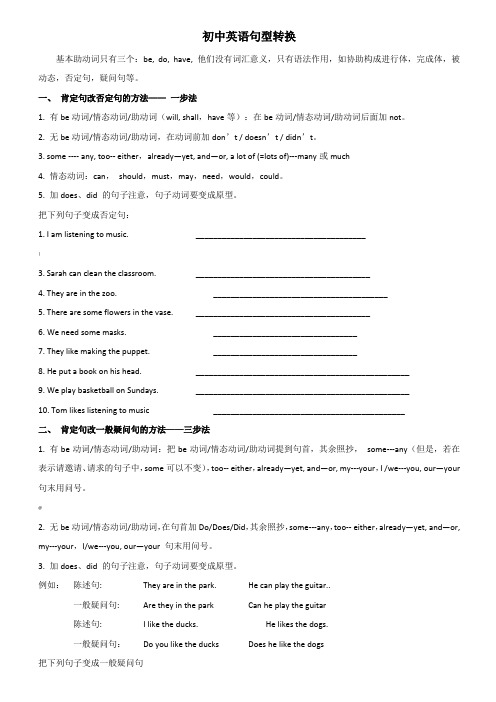
初中英语句型转换基本助动词只有三个:be, do, have, 他们没有词汇意义,只有语法作用,如协助构成进行体,完成体,被动态,否定句,疑问句等。
一、肯定句改否定句的方法——一步法1. 有be动词/情态动词/助动词(will, shall,have等):在be动词/情态动词/助动词后面加not。
2. 无be动词/情态动词/助动词,在动词前加don’t / doesn’t / didn’t。
3. some ---- any,too-- either,already—yet, and—or, a lot of (=lots of)---many或much4. 情态动词:can,should,must,may,need,would,could。
5. 加does、did 的句子注意,句子动词要变成原型。
把下列句子变成否定句:1. I am listening to music. _______________________________________|3. Sarah can clean the classroom. ________________________________________4. They are in the zoo. ________________________________________5. There are some flowers in the vase. ________________________________________6. We need some masks. _________________________________7. They like making the puppet. _________________________________8. He put a book on his head. _________________________________________________9. We play basketball on Sundays. _________________________________________________10. Tom likes listening to music ____________________________________________二、肯定句改一般疑问句的方法——三步法1. 有be动词/情态动词/助动词:把be动词/情态动词/助动词提到句首,其余照抄,some---any(但是,若在表示请邀请、请求的句子中,some可以不变),too-- either,already—yet, and—or, my---your,I /we---you, our—your 句末用问号。
陈述句变一般疑问句特殊疑问句及练习
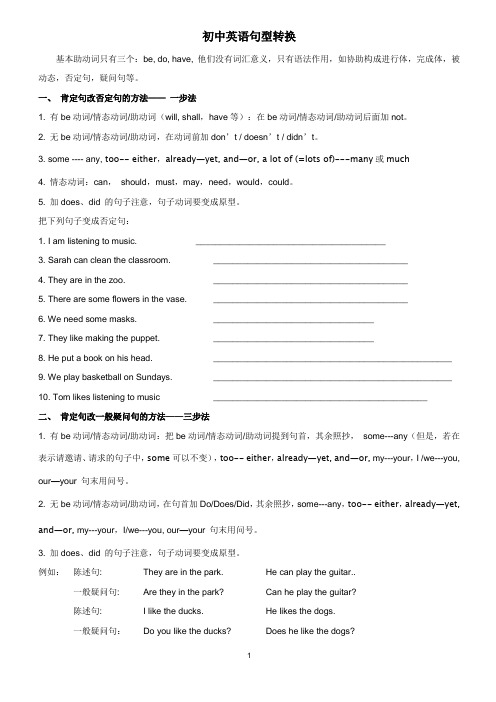
初中英语句型转换基本助动词只有三个:be, do, have, 他们没有词汇意义,只有语法作用,如协助构成进行体,完成体,被动态,否定句,疑问句等。
一、肯定句改否定句的方法——一步法1. 有be动词/情态动词/助动词(will, shall,have等):在be动词/情态动词/助动词后面加not。
2. 无be动词/情态动词/助动词,在动词前加don’t / doesn’t / didn’t。
3. some ---- any,too-- either,already—yet, and—or, a lot of (=lots of)---many或much4. 情态动词:can,should,must,may,need,would,could。
5. 加does、did 的句子注意,句子动词要变成原型。
把下列句子变成否定句:1. I am listening to music. _______________________________________3. Sarah can clean the classroom. ________________________________________4. They are in the zoo. ________________________________________5. There are some flowers in the vase. ________________________________________6. We need some masks. _________________________________7. They like making the puppet. _________________________________8. He put a book on his head. _________________________________________________9. We play basketball on Sundays. _________________________________________________10. Tom likes listening to music ____________________________________________二、肯定句改一般疑问句的方法——三步法1. 有be动词/情态动词/助动词:把be动词/情态动词/助动词提到句首,其余照抄,some---any(但是,若在表示请邀请、请求的句子中,some可以不变),too-- either,already—yet, and—or, my---your,I /we---you, our—your 句末用问号。
肯定句变特殊疑问句的方法
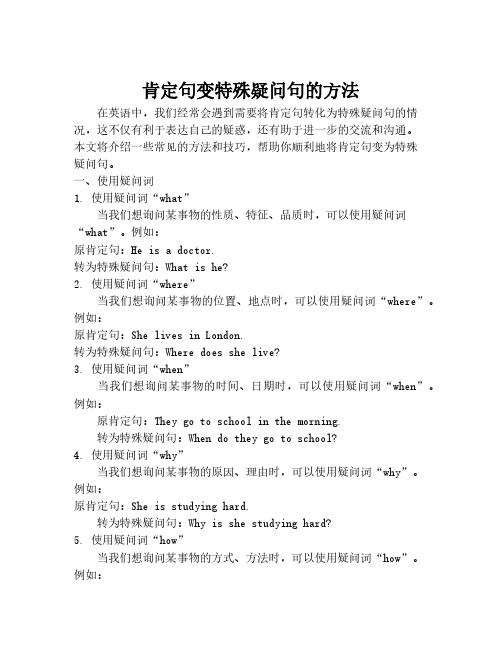
肯定句变特殊疑问句的方法在英语中,我们经常会遇到需要将肯定句转化为特殊疑问句的情况,这不仅有利于表达自己的疑惑,还有助于进一步的交流和沟通。
本文将介绍一些常见的方法和技巧,帮助你顺利地将肯定句变为特殊疑问句。
一、使用疑问词1. 使用疑问词“what”当我们想询问某事物的性质、特征、品质时,可以使用疑问词“what”。
例如:原肯定句:He is a doctor.转为特殊疑问句:What is he?2. 使用疑问词“where”当我们想询问某事物的位置、地点时,可以使用疑问词“where”。
例如:原肯定句:She lives in London.转为特殊疑问句:Where does she live?3. 使用疑问词“when”当我们想询问某事物的时间、日期时,可以使用疑问词“when”。
例如:原肯定句:They go to school in the morning.转为特殊疑问句:When do they go to school?4. 使用疑问词“why”当我们想询问某事物的原因、理由时,可以使用疑问词“why”。
例如:原肯定句:She is studying hard.转为特殊疑问句:Why is she studying hard?5. 使用疑问词“how”当我们想询问某事物的方式、方法时,可以使用疑问词“how”。
例如:原肯定句:He solved the problem.转为特殊疑问句:How did he solve the problem?二、将助动词提前在一些情况下,我们可以通过将助动词提前来将肯定句变为特殊疑问句。
例如:原肯定句:She can speak French.转为特殊疑问句:Can she speak French?三、使用陈述句语序当我们将肯定句变为特殊疑问句时,可以直接使用陈述句的语序,即主语+谓语+其他成分。
例如:原肯定句:They have finished their homework.转为特殊疑问句:Have they finished their homework?四、加入特殊疑问词和助动词有时候,我们需要在特殊疑问句中加入特殊疑问词和助动词,以满足语法结构的要求。
一般疑问句改特殊疑问的方法
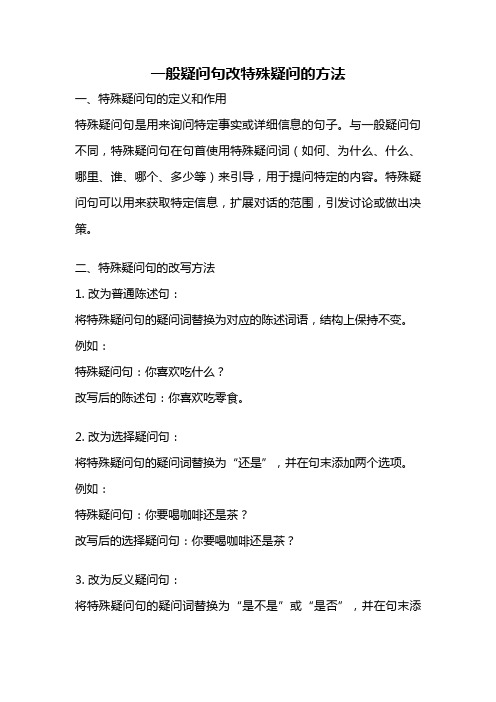
一般疑问句改特殊疑问的方法一、特殊疑问句的定义和作用特殊疑问句是用来询问特定事实或详细信息的句子。
与一般疑问句不同,特殊疑问句在句首使用特殊疑问词(如何、为什么、什么、哪里、谁、哪个、多少等)来引导,用于提问特定的内容。
特殊疑问句可以用来获取特定信息,扩展对话的范围,引发讨论或做出决策。
二、特殊疑问句的改写方法1. 改为普通陈述句:将特殊疑问句的疑问词替换为对应的陈述词语,结构上保持不变。
例如:特殊疑问句:你喜欢吃什么?改写后的陈述句:你喜欢吃零食。
2. 改为选择疑问句:将特殊疑问句的疑问词替换为“还是”,并在句末添加两个选项。
例如:特殊疑问句:你要喝咖啡还是茶?改写后的选择疑问句:你要喝咖啡还是茶?3. 改为反义疑问句:将特殊疑问句的疑问词替换为“是不是”或“是否”,并在句末添加一个相反的陈述。
例如:特殊疑问句:你明天要来参加会议吗?改写后的反义疑问句:你明天要来参加会议,是不是?4. 改为带有否定意义的特殊疑问句:将特殊疑问句的疑问词替换为“不是什么”或“不怎么”,并在句末添加一个否定的陈述。
例如:特殊疑问句:你不是在学校吗?改写后的带有否定意义的特殊疑问句:你不是不在学校吗?5. 改为带有原因的特殊疑问句:将特殊疑问句的疑问词替换为“为什么”,并在句末加上原因。
例如:特殊疑问句:你为什么不喜欢吃辣?改写后的带有原因的特殊疑问句:你为什么不喜欢吃辣,因为太辣了吗?6. 改为带有补充信息的特殊疑问句:将特殊疑问句的疑问词替换为“还有什么”或“除了...还有”,并在句末加上补充信息。
例如:特殊疑问句:你学过哪些外语?改写后的带有补充信息的特殊疑问句:你学过哪些外语,还有什么?7. 改为带有时间信息的特殊疑问句:将特殊疑问句的疑问词替换为“什么时候”,并在句末加上时间信息。
例如:特殊疑问句:你什么时候去旅行?改写后的带有时间信息的特殊疑问句:你什么时候去旅行,明天还是下周?8. 改为带有地点信息的特殊疑问句:将特殊疑问句的疑问词替换为“在哪里”,并在句末加上地点信息。
陈述句变否定句一般疑问句特殊疑问句和练习试题
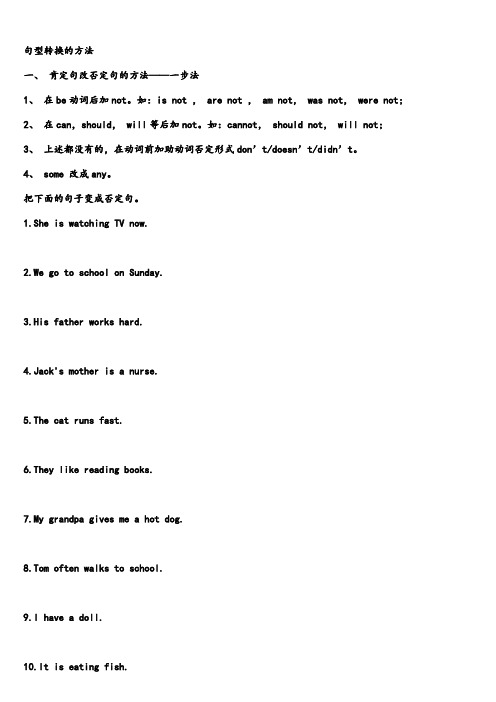
句型转换的方法一、肯定句改否定句的方法——一步法1、在be动词后加not。
如:is not , are not , am not, was not, were not;2、在can,should, will等后加not。
如:cannot, should not, will not;3、上述都没有的,在动词前加助动词否定形式don’t/doesn’t/didn’t。
4、 some 改成any。
把下面的句子变成否定句。
1.She is watching TV now.2.We go to school on Sunday.3.His father works hard.4.Jack's mother is a nurse.5.The cat runs fast.6.They like reading books.7.My grandpa gives me a hot dog.8.Tom often walks to school.9.I have a doll.10.It is eating fish.二、肯定句改一般疑问句的方法——三步法1、把be动词放在句首,剩下的照抄,(some 改成any,my改成your等)句点改成问号。
2、把can,shall, will等放到句首,剩下的照抄,(some 改成any,my改成your等)句点改成问号。
例如:陈述句: They are in the park. He can play the guitar..一般疑问句: Are they in the park? Can he play the guitar?把下列句子变成一般疑问句1. I am listening to music.______________________________________2. Mike is a student._______________________________________3. Sarah can clean the classroom.________________________________________4. They are in the zoo.________________________________________5. There are some flowers in the vase.________________________________________6.This is my sister._________________________________________7.We are sweeping the floor.__________________________________________3、上述都没有的,在句首请助动词Do/Does/Did帮忙,剩下的照抄,(some 改成any,my改成your 等)句点改成问号。
小学英语句型转换(陈述句变一般疑问句特殊疑问句及练习)
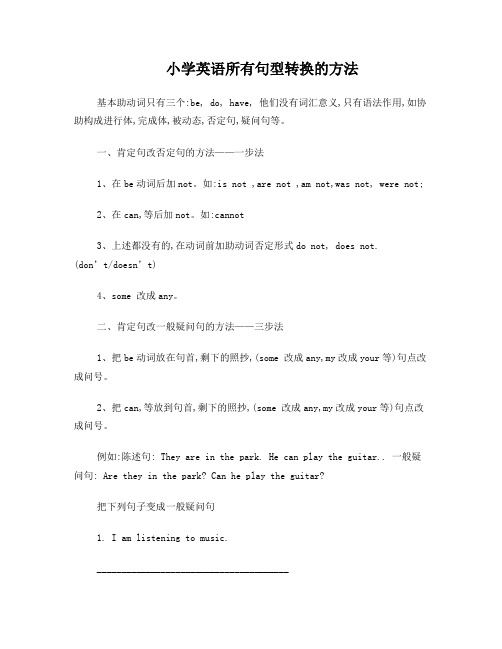
小学英语所有句型转换的方法基本助动词只有三个:be, do, have, 他们没有词汇意义,只有语法作用,如协助构成进行体,完成体,被动态,否定句,疑问句等。
一、肯定句改否定句的方法——一步法1、在be动词后加not。
如:is not ,are not ,am not,was not, were not;2、在can,等后加not。
如:cannot3、上述都没有的,在动词前加助动词否定形式do not, does not.(don’t/doesn’t)4、some 改成any。
二、肯定句改一般疑问句的方法——三步法1、把be动词放在句首,剩下的照抄,(some 改成any,my改成your等)句点改成问号。
2、把can,等放到句首,剩下的照抄,(some 改成any,my改成your等)句点改成问号。
例如:陈述句: They are in the park. He can play the guitar.. 一般疑问句: Are they in the park? Can he play the guitar?把下列句子变成一般疑问句1. I am listening to music._______________________________________2. Mike is a student._______________________________________3. Sarah can clean the classroom.________________________________________4. They are in the zoo.________________________________________5. There are some flowers in the vase.________________________________________6.This is my sister._________________________________________7.We are sweeping the floor.__________________________________________3、上述都没有的,在句首请助动词Do/Does帮忙,剩下的照抄, (some 改成any,my改成your等)句点改成问号。
陈述句变特殊疑问句的规则总结
一、含有be动词的一般疑问句,通常把be动词调到句首。
例如:陈述句:They are in the swimming pool.一般疑问句:Are they in the swimming pool?注意:一般疑问句句末要用“?”。
二、含有情态动词的一般疑问句(can, may...),把情态动词调到句首。
例如:陈述句:He can drive a car.一般疑问句: Can he drive a car?三、含有have的一般疑问句,have译为“有”。
一般疑问句式有两种形式:1.把have/has调到句首。
例如:陈述句:Tommy has a computer.一般疑问句:Has Tommy/he a computer?2.加助动词do/does,第三人称单数用does,其他人称用do。
其句型为:Do/Does + 主语+ have...?例如上句可变为:Does Tommy have a computer?一般疑问句:以be动词, have /has/do等助动词、can/may等情态动词开头,以yes或no来回答的问句。
它的基本结构是:Be/Have /Has/Did等助动词(包括情态动词)+主语+谓语(包括表语)+┄?回答常用简略回答。
四、句子里没有be动词、助动词、情态动词(am/is/are/was/were/will/can/may/must/could/have/has[有])等,就需要加助动词do, does,(三单)、did(过去式)来构成疑问句,加上这些助动词后,句子中谓语动词必须用原形。
其句型为:Do/Does/did + 主语+ 动词原形+其它?陈述句:Amy speaks English.一般疑问句:Does Amy speak English?注意:在把肯定句改成否定句或一般疑问句的时候,要注意句中是否有already、some、something、somebody等词,如果有也必须进行改变,already要改成yet,some、something、somebody等分别改成any、anything、anybody等。
英语所有句型转换的方法(陈述句变否定句一般疑问句特殊疑问句及练习)
英语所有句型转换的方法基本助动词只有三个:be, do, have, 他们没有词汇意义,只有语法作用,如协助构成进行体,完成体,被动态,否定句,疑问句等。
一、肯定句改否定句的方法——一步法1、在be动词后加not。
如:is not ,are not ,am not,was not,were not;2、在can,等后加not。
如:cannot3、上述都没有的,在动词前加助动词否定形式do not, does not. (don’t/doesn’t)4、some 改成any。
二、肯定句改一般疑问句的方法——三步法1、把be动词放在句首,剩下的照抄,(some 改成any,my改成your等)句点改成问号。
2、把can,等放到句首,剩下的照抄,(some 改成any,my改成your等)句点改成问号。
例如:陈述句: They are in the park. He can play the guitar.. 一般疑问句: Are they in the park? Can he play the guitar?把下列句子变成一般疑问句1. I am listening to music._______________________________________2. Mike is a student._______________________________________3. Sarah can clean the classroom.________________________________________4. They are in the zoo.________________________________________5. There are some flowers in the vase.________________________________________is my sister._________________________________________are sweeping the floor.__________________________________________3、上述都没有的,在句首请助动词Do/Does帮忙,剩下的照抄,(some 改成any,my改成your等)句点改成问号。
句型转换特殊疑问句
句型转换特殊疑问句特殊疑问句是指以特殊疑问词引导的疑问句,它需要特殊疑问词来对句子的某个成分进行提问。
在英语中,特殊疑问句的变换可以通过改变句型来实现,这样可以更灵活地表达意思。
本文将介绍一些常见的句型转换特殊疑问句的方法。
一、一般疑问句转特殊疑问句一般疑问句转特殊疑问句的方法是将一般疑问句的主语或宾语改为特殊疑问词。
例如:1. Does she like apples?改为:What does she like?2. Can they swim in the river?改为:Where can they swim?3. Did he go to the party last night?改为:When did he go to the party?二、陈述句转特殊疑问句陈述句转特殊疑问句的方法是将陈述句中的句子成分变为以特殊疑问词引导的特殊疑问句。
例如:1. She is going to the supermarket.改为:Where is she going?2. They went to the beach yesterday.改为:When did they go to the beach?3. John bought a new car.改为:Who bought a new car?三、特殊疑问句转陈述句特殊疑问句转陈述句的方法是将特殊疑问句中的特殊疑问词换成陈述句中相应的成分。
例如:1. What color is his jacket?改为:His jacket is black.2. Where did he find his phone?改为:He found his phone in the park.3. How many books did she read?改为:She read five books.四、特殊疑问句转选择疑问句特殊疑问句转选择疑问句的方法是将特殊疑问句中的特殊疑问词换成“or not”。
改特殊疑问句练习题
改特殊疑问句练习题1. 陈述句:Tom is going to the library this afternoon.特殊疑问句:Who is going to the library this afternoon?2. 陈述句:She has finished her homework.特殊疑问句:What has she finished?3. 陈述句:They will have a meeting at 3 PM.特殊疑问句:When will they have a meeting?4. 陈述句:The new movie is very exciting.特殊疑问句:How is the new movie?5. 陈述句:He is from Shanghai.特殊疑问句:Where is he from?6. 陈述句:She likes playing the piano.特殊疑问句:What does she like doing?7. 陈述句:We usually have lunch at 12:00.特殊疑问句:What time do you usually have lunch?8. 陈述句:They have been to Paris twice.特殊疑问句:How many times have they been to Paris?9. 陈述句:He will buy a new car next month.特殊疑问句:What will he buy next month?10. 陈述句:The concert starts at 7:30 PM.特殊疑问句:What time does the concert start?11. 陈述句:She has been learning English for three years.特殊疑问句:How long has she been learning English?12. 陈述句:They are planning to go on a trip next weekend.特殊疑问句:What are they planning to do next weekend?13. 陈述句:The book is on the table.特殊疑问句:Where is the book?14. 陈述句:He can speak three languages.特殊疑问句:How many languages can he speak?15. 陈述句:She is reading a novel.特殊疑问句:What is she reading?16. 陈述句:They have been working here since 2010.特殊疑问句:Since when have they been working here?17. 陈述句:The store opens at 9 AM.特殊疑问句:When does the store open?18. 陈述句:She is waiting for the bus at the bus stop.特殊疑问句:Where is she waiting?19. 陈述句:He has visited five countries.特殊疑问句:How many countries has he visited?20. 陈述句:The party will be held at my house.特殊疑问句:Where will the party be held?21. 陈述句:They are learning French at the language school.特殊疑问句:What language are they learning at the language school?22. 陈述句:The concert was amazing.特殊疑问句:How was the concert?23. 陈述句:She is a doctor.特殊疑问句:What is her profession?24. 陈述句:He has been swimming for two hours.特殊疑问句:How long has he been swimming?25. 陈述句:The train leaves at 5 PM.特殊疑问句:What time does the train leave?26. 陈述句:They will travel to Japan next year.特殊疑问句:Where will they travel next year?27. 陈述句:She has a beautiful voice.特殊疑问句:What does she have?28. 陈述句:The meeting room is on the second floor.特殊疑问句:Where is the meeting room?29. 陈述句:He has been playing the guitar since he was ten.特殊疑问句:Since when has he been playing the guitar?30. 陈述句:The movie was released last Friday.特殊疑问句:When was the movie released?注意:请根据上述陈述句改写成相应的特殊疑问句,并确保疑问句的语法正确,表达清晰。
